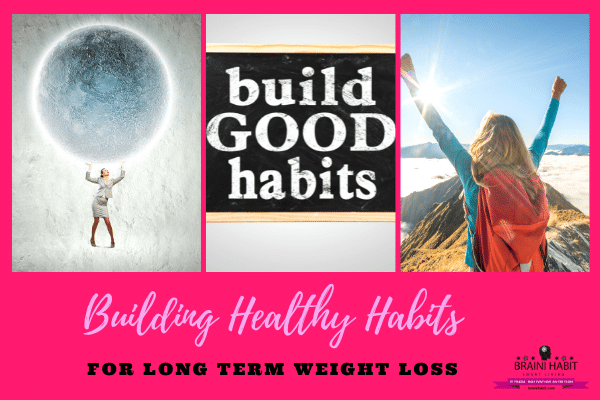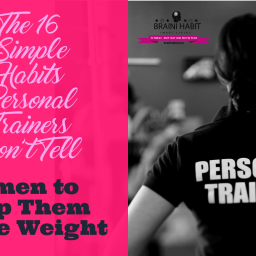Do you know that many people who made drastic lifestyle changes and lose weight usually end up gaining it all back?
One study shows that only 20% of people who exercise and follow a healthy diet can lose weight and keep it up for a long time.
Gaining weight after losing weight is frustrating, to say the least.
In fact, you may not even feel like working out or eating healthily again because you know that you are likely going to gain it all back.
If you are in this situation, you are going to benefit from this article. Read on to learn some science-backed strategies that can keep your body fit and prevent you from regaining weight.
Before we dive right into these tips, we are first going to be looking at 3 main reasons why people regain weight.

Why people aren’t able to maintain weight loss
The weight loss journey of a lot of people is two-phase. The first is where they lose weight. The second is where they gain all the weight they lost back.
Below are some reasons why people regain weight
Following a restrictive diet
As you likely know, following a restrictive diet is hard.
If you are just starting out, you may be able to keep up with a strict diet, as you are super motivated.
As time goes on, it will become more challenging to follow it. In the end, you may give up on the diet, and start eating the foods you have been depriving yourself of, and gain weight.
According to one study, following a diet that requires you to reduce your calorie intake drastically may result in two issues that are linked to weight gain (1).
The first is the reduction of your metabolism rate. When this happens, your body won’t be able to burn many calories on its own. The second is the mass production of hunger-inducing hormones. When this happens, you are likely going to overeat.
Not building healthy habits
Many diets are centered on following strict rules.
Because we aren’t perfect, we are likely going to break these rules after a while. When this happens, most people will be devastated and give up on their weight loss goals.
Building healthy habits is much better than following a set of rules.
If you can build healthy habits like eating fruits and vegetables, drinking more water, and doing fun exercises a couple of times weekly, it will be difficult for you to regain weight.
Not working out regularly
If you stop exercising after building your dream body, you are likely going to gain all the weight you lost after a while.
Studies have shown that exercising regularly can boost metabolism, increase the number of calories you burn, especially on the days you work out, and help you achieve energy balance (2) (3).
Energy balance is when you burn the same amount of calories that you consume.
After achieving your fitness goals, the next thing that should be on your mind is how to maintain it.
Several studies have shown that one may have to do at least 200 minutes of moderately intense exercises weekly (30 minutes daily) to prevent weight gain (4) (5) (6).
If you are prone to weight gain, you may need to increase the intensity of your workout to remain in shape. After a careful review of many studies, researchers found that some people may have to exercise for an hour to prevent weight gain (7).
Note that regular exercise is only one side of the coin when it comes to preventing weight gain. Other factors like following a healthy diet, drinking more water, and many more are equally important (8).
Eat more protein
Adding protein-rich foods to your diet will not only help you lose weight but also prevent you from gaining weight.
Several studies have shown that eating protein-rich foods, especially in the morning, can reduce cravings and make you less likely to overeat (9) (10) (11).
Newer studies are showing that protein can promote the production of hormones that can regulate your weight and make you feel satisfied. These studies also pointed out that protein can reduce the level of the hormones that make us feel hungry (12) (13).
Besides reducing your appetite and making you feel fuller, protein can also increase your metabolism and help your body burn more calories on its own. To enjoy this benefit, protein should make at least 30% of the number of calories you consume (14) (15) (16).
Protein is somewhat different from other food groups like carbs that our body can break down quickly. Studies have shown that our body uses an enormous amount of energy to break down protein (17) (18). This explains why people on a high protein diet tend to burn more calories during the day.
Protein can also help you build muscles. And as you know, the more muscles you have, the more calories your body will be able to burn.
Prepare yourself for failure and setbacks
Having the all or nothing mentality or trying to be perfect is only going to set you up for failure. And when you eventually fail, it may be difficult for you to get back on your feet and keep working on your fitness goals.
The path to weight loss and weight maintenance isn’t as smooth and easy as many people think.
There are going to be times when you will skip a workout, eat out of your diet, drink sugary beverages, and so on. Your discipline and will power will definitely reduce at some point.
If you aren’t prepared for setbacks like this, you may start to beat yourself up and even consider giving up.
On the other hand, if you have it at the back of your mind that you are going to make mistakes and a few poor choices along the way, it will be easier for you to get back on track after derailing from your goals.
To reduce the odds of you eating out of your diet, you have to make elaborate plans for situations that will make eating healthy difficult.
For example, if you get an invite to a party or gathering where unhealthy food and drinks will be served, you can make a plan to eat delicious healthy foods before going to the party. Doing this, will make you less likely to binge eat unhealthy foods while you are there.
Drink more water
Do you know that drinking more water can improve your health and help maintain your weight?
Studies have shown that drinking water (a glass or two) can promote fullness and prevent one from overeating (19) (20).
One of the best times to drink water is before meals.
According to one study, drinking water before meals can help reduce calorie intake. The participants of the study, who drank water before their meals had a 13% reduction in their food intake (21).
In addition to making you eat less, drinking water can help increase the number of calories you burn daily (22).
Eat more vegetables
Vegetables are an excellent addition to any diet, as they are rich in vitamins, fiber, and some nutrients our body needs.
Many studies are showing that vegetables can do more than just improve our health. These studies have found out that high vegetable intake can boost our immune system and encourage weight loss (23)(24)(25).
Unlike other food groups that can make you gain weight if you consume a huge amount of them, vegetables are low in calories. This means that you can eat as much of them as you want without gaining weight or becoming obese (26) (27) (28).
As previously mentioned, vegetables are high in fiber. So eating them will make you fuller and less likely to overeat later on (29) (30).
Note that you don’t have to overeat vegetables to enjoy the benefits they offer, consuming a serving or 2 at every meal may be enough.
Ensure that you are getting enough sleep
Several studies have shown that lack of sleep and sleep deprivation is associated with weight gain (31) (32).
If you don’t get enough sleep, your body will increase the production of ghrelin, a hormone that is associated with hunger and increased appetite (33).
People who sleep for short periods are usually tired and less motivated to exercise and eat healthily.
To ensure that you don’t gain weight, try to get between 6 to 8 hours of sleep daily.
The bottom line on a simple guide for long term weight loss by building healthy habits
Regardless of the nature of your fitness goals, remember that following an overly strict and restrictive diet is likely going to lead to weight regain.
Making simple changes to your routine and building healthy habits is always a better option, as you will be more likely to stick with them in the long run.
Don’t forget that what you eat can either sabotage your weight loss efforts or draw you closer to your weight loss goals.




